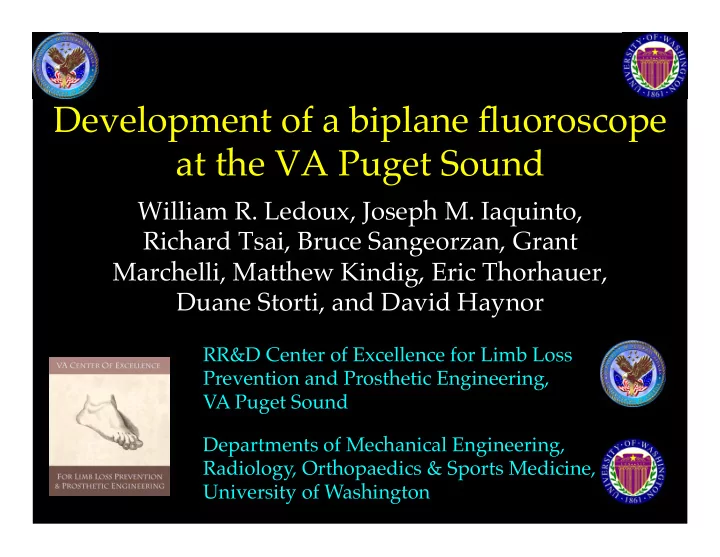

Development of a biplane fluoroscope � at the VA Puget Sound William R. Ledoux, Joseph M. Iaquinto, Richard Tsai, Bruce Sangeorzan, Grant Marchelli, Matthew Kindig, Eric Thorhauer, Duane Storti, and David Haynor RR&D Center of Excellence for Limb Loss Prevention and Prosthetic Engineering, VA Puget Sound Departments of Mechanical Engineering, Radiology, Orthopaedics & Sports Medicine, University of Washington
Motivation for biplane fluoroscope development • CT Ledoux WR, et al., J Orthop Research, 24, 2006 Fassbind MJ, et al., Journal of Biomechanical Whittaker EC, et al., Gait and Posture, in review 2011 Engineering, 133, 2011 • MRI • Retro-reflective markers
Bone pins Arndt et al., 2007 Invasive; not used for routine clinical care
Fluoroscopy systems De Clercq et al., 1994 Single plane; exposure to radiation
Fluoroscopy systems Yamaguchi et al., 2009 hindfoot only; exposure to radiation; 3D-2D
Fluoroscopy systems Li et al., 2008 Caputo et al., 2009 Portion of stance; exposure to radiation
Biplane fluoroscopy • Custom biplane room too expensive – Henry Ford Hospital, U Pittsburgh, Brown • C-arms – Mass General Hospital, Duke • Modify existing C-arms – Steadman-Philippon Research Institute • Hardware: – Two Philips BV-Pulsera C-arms • Software: – Customized
Biplane fluoroscopy
Biplane fluoroscopy
Biplane fluoroscopy
Biplane fluoroscopy X-Ray X-Ray Source Source
Foot phantom www.phantomlab.com
Dynamic data collection
Biplane fluoroscopy
Philips BV Pulsera C-Arms • Typical hospital C-arm • 30 pulses/s or continuous
Synchronizing systems
Disassembling C-arms
Custom mounting devices
Replacing cameras
Final floor
Light sabers?
Laser alignment
Customized software • Matlab, C/C++, CUDA • Phase I: distortion and bias correction, 3D calibration • Phase II: generation of digital reconstructed radiographs (DRRs) • Phase III: implementation of similarity measures and comparison methods • Phase IV: speed and memory optimization
Distortion correction
Flat-field correction
3D Calibration
3D calibration revised
Validation: Bead-based • Machined block or “wand” – 1.6mm tantalum beads – measured within 7 microns • Wand translated and rotated via a 1 micron precision stepper-motor (static testing) • Wand manually waved though FOV at ~0.5m/s (dynamic testing)
Validation: Bead-based, Static • Average translational accuracy = 0.0811 mm • Average translational precision = ± 0.0103 mm • Average rotational accuracy = 0.1541° • Average rotation precision = ± 0.1382 °
Validation: Bead-based, Dynamic • Average accuracy = 0.1260 mm • Average precision = ± 0.1218 mm
Validation: Bone-based • Bones in foam block – 1.6mm tantalum beads • Block translated and rotated via a 1 micron precision stepper-motor (static testing) • Block manually waved though FOV at ~1 m/s (dynamic testing)
Validation: Bone-based, Static
Sample DRR
GUI: unoptimized
GUI: optimized
Sample videos
Recommend
More recommend